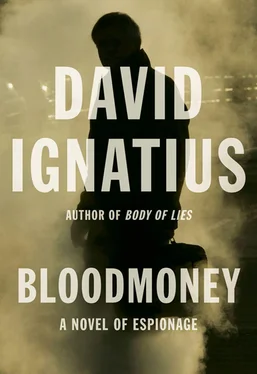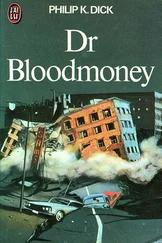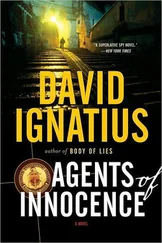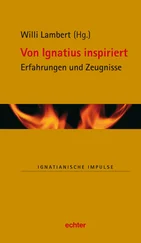David Ignatius - Bloodmoney
Здесь есть возможность читать онлайн «David Ignatius - Bloodmoney» весь текст электронной книги совершенно бесплатно (целиком полную версию без сокращений). В некоторых случаях можно слушать аудио, скачать через торрент в формате fb2 и присутствует краткое содержание. Жанр: Шпионский детектив, на английском языке. Описание произведения, (предисловие) а так же отзывы посетителей доступны на портале библиотеки ЛибКат.
- Название:Bloodmoney
- Автор:
- Жанр:
- Год:неизвестен
- ISBN:нет данных
- Рейтинг книги:4 / 5. Голосов: 1
-
Избранное:Добавить в избранное
- Отзывы:
-
Ваша оценка:
- 80
- 1
- 2
- 3
- 4
- 5
Bloodmoney: краткое содержание, описание и аннотация
Предлагаем к чтению аннотацию, описание, краткое содержание или предисловие (зависит от того, что написал сам автор книги «Bloodmoney»). Если вы не нашли необходимую информацию о книге — напишите в комментариях, мы постараемся отыскать её.
Bloodmoney — читать онлайн бесплатно полную книгу (весь текст) целиком
Ниже представлен текст книги, разбитый по страницам. Система сохранения места последней прочитанной страницы, позволяет с удобством читать онлайн бесплатно книгу «Bloodmoney», без необходимости каждый раз заново искать на чём Вы остановились. Поставьте закладку, и сможете в любой момент перейти на страницу, на которой закончили чтение.
Интервал:
Закладка:
Let me die, Omar thinks. But in the hours and days and years that follow, he has another thought that comes from his blood and sinews more than his mind: Let me have the honor that is badal, the insult that answers the insult. He does not mean this in a general sense, but in a very particular way. The people who operate the drones, Omar knows very well, are from the Central Intelligence Agency. He knows too much about them. It is not enough to hate these people; he wants to have power over them and make them afraid.
He does not take this revenge in the immediate, visceral way that his brother Karimullah might have done. He returns to the National University of Science and Technology. His physical wounds heal, and he does not discuss what happened in Makeen. He continues with his consulting work, too, for the IT departments of a bank in Dubai and another in Geneva. He maintains his other contacts abroad, with the friends he met in California. When people introduce him to foreigners, they say that he is a model for the future of the tribal areas: a gifted man, world-class, you could say, a young man from South Waziristan who shows that it is possible to escape the tribal code.
People address him as “ustad,” the learned one. But truly he is a ghost. He travels to the Persian Gulf and to Europe. He is so thin and fit he might run a marathon, or enter a monastery. He finds new friends who are useful to him. It is still many months before our story begins, but he is motivated by one thought: The people who think they are safe must know what it is to be hunted.
1
In the softening light of another afternoon, nearly two years later, the facade of the Inter-Services Intelligence headquarters looked almost welcoming. It was an anonymous gray stucco building in the Aabpara neighborhood of the capital, set back from the Kashmir Highway. The only distinctive feature was a ribbon of black stone that wrapped around the front, making it look as tidy as a gift box. Although the building was unmarked, the ISI’s presence in the neighborhood was hardly a secret. Pakistanis in other branches of the military referred to its operatives as “the boys from Aabpara,” as if they were a neighborhood gang to whom special respect must be paid. Ordinary Pakistanis made it a rule not to speak about the ISI at all.
Inside this house of secrets, facing onto an enclosed garden, was the office of the director general, who in recent years had been a soft-spoken man named Mohammed Malik. On his shoulders, he wore the crossed swords-and-crescent insignia of a lieutenant general. His authority didn’t come from his rank in the army, but from his control of information. It was almost always the case that General Malik knew more than the people around him, but he made it a rule never to flaunt what he knew, or to disclose how he had obtained it. That would be insecure and, worse, impolite.
General Malik was not an imposing man, at least in the way of a military officer. He was trim, with a neat mustache, and he was careful about what he ate and drank, almost to the point of fastidiousness. He had soft hands, and a reticent manner. It was easy to forget that he was in fact a professional liar, who told the entire truth only to his commander, the chief of army staff.
On this particular spring afternoon, General Malik had a concern that he wasn’t sure how to address. The brigadier who represented his service in Karachi had called to alert him to a potential problem. Now, there were large and small problems in Pakistan, but the very biggest ones were often connected to the words “United States of America.” For it was said, not without reason, that Pakistan’s life was bounded by the three A’s-Allah, Army and America. And in the brigadier’s news from Karachi, all three were tied up in one.
It was part of General Malik’s aura among his colleagues at General Headquarters in Rawalpindi that he knew how to handle the Americans. This was based partly on the fact that he had spent a year at the Army War College in Fort Leavenworth, Kansas. And if you knew Kansas, people said, well, then, you knew the real America. Malik had actually disliked Kansas, and the only part of America that he had truly loved was the Rockies, where the thin air and the steep peaks reminded him of his ancestral home in the mountains of Kashmir. But he knew how to sham, in the way that is an art form for the people of South Asia, and so he had pretended for years to have a special fondness for Americans from the heartland.
In that spirit of sincere and also false bonhomie, the director general placed a call to Homer Barkin, the chief of the CIA station at the ever-expanding American Embassy in Islamabad. Their regular liaison meeting was scheduled for later in the week, but General Malik asked if his American partner might stop by that afternoon, perhaps right away, if it was convenient. He didn’t explain why, for he had found that it is always a good rule to say less than you mean, particularly when you are dealing with Americans, who do the opposite.
“My friend Homer,” said General Malik in greeting the chief of station when he arrived in Aabpara forty-five minutes later. He usually addressed him that way, and the American responded by calling him “my friend Mohammed,” or sometimes, when he wanted something, just “my friend Mo.” General Malik found that especially grating, but he never said anything. He clasped his visitor’s hand in the firm way that Americans liked.
Barkin did not look well. His face was doughy, and he looked bulky in his suit jacket, like a sausage ready to burst its casing. General Malik knew why: Homer Barkin had been drinking, and the reason was that he had legal problems back home. He was one of the many CIA officers who had been caught in the boomerang effect of the “war on terror.” It was said that he had “crossed the line” in a previous job by being overzealous in targeting the enemy.
Looking at Homer Barkin, his eyes dark from the sleeplessness of depression, his collar button straining against the flesh of his neck, it seemed unlikely that he had ever been capable of zealotry in any form. But this was the “after” picture; he would not have been made station chief in Islamabad if there had not been a “before.”
“My dear friend Homer,” the Pakistani continued, “I hope you will not mind me saying so, but you are looking a little tired. You must be working too hard.”
“You don’t know the half of it, believe me,” said the CIA officer.
“No, indeed, I do not. Or even the quarter of it. And I am sorry for it, whatever it may be. But I hope that you will take care of yourself in these treacherous times. You are a guest in our house. You are precious to us.”
“Appreciate it.” Barkin’s eyes were flat and his demeanor was impassive. He was not a man who was easily flattered or cajoled. “What’s up, General?”
“Let me put it to you, sir: We have had many successes together in recent years, have we not? You could almost say that we are partners. Am I right? And so we like to think that there is a bit of trust between us, even though we are a poor and weak country compared to the United States. We have our pride, you see.”
“I never forget that, Mohammed, not for one day.”
“Well, then, I have a question for you. Normally, I would not trouble you in the late afternoon with such a detail, but this one is rather important. I hope you will forgive the imposition, and apologize to Mrs. Barkin for delaying your return home this evening.”
“Mrs. Barkin lives in Washington, General. I don’t know if I can give you an answer, but I won’t tell you a lie.”
General Malik smiled. Americans did not like lying to others. It made them uncomfortable. Their specialty was lying to themselves.
Читать дальшеИнтервал:
Закладка:
Похожие книги на «Bloodmoney»
Представляем Вашему вниманию похожие книги на «Bloodmoney» списком для выбора. Мы отобрали схожую по названию и смыслу литературу в надежде предоставить читателям больше вариантов отыскать новые, интересные, ещё непрочитанные произведения.
Обсуждение, отзывы о книге «Bloodmoney» и просто собственные мнения читателей. Оставьте ваши комментарии, напишите, что Вы думаете о произведении, его смысле или главных героях. Укажите что конкретно понравилось, а что нет, и почему Вы так считаете.












